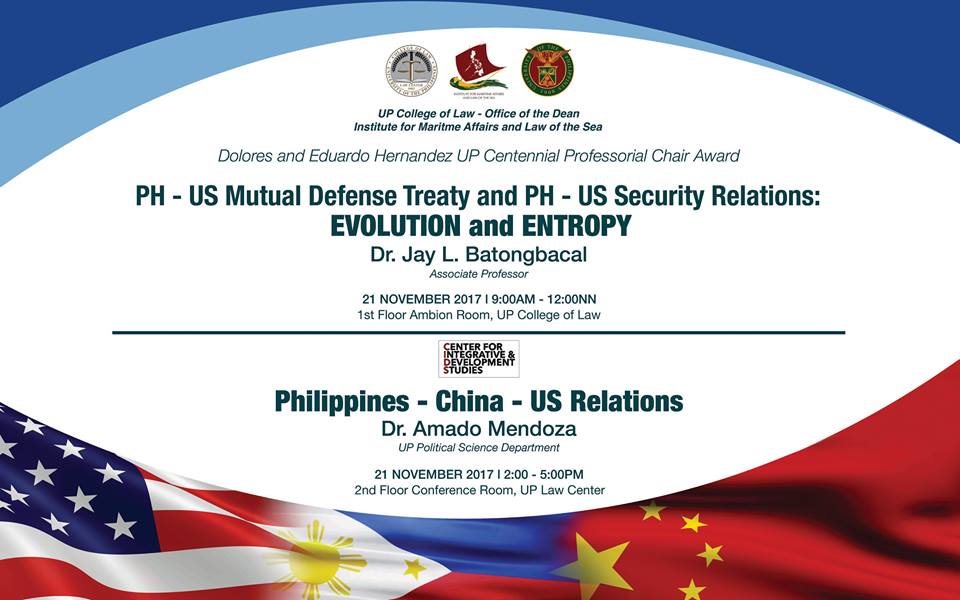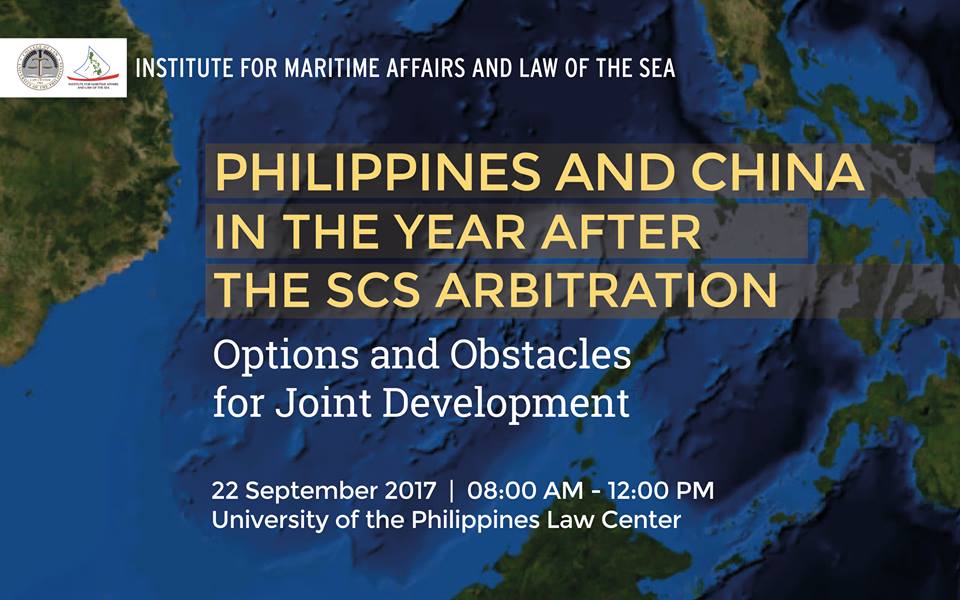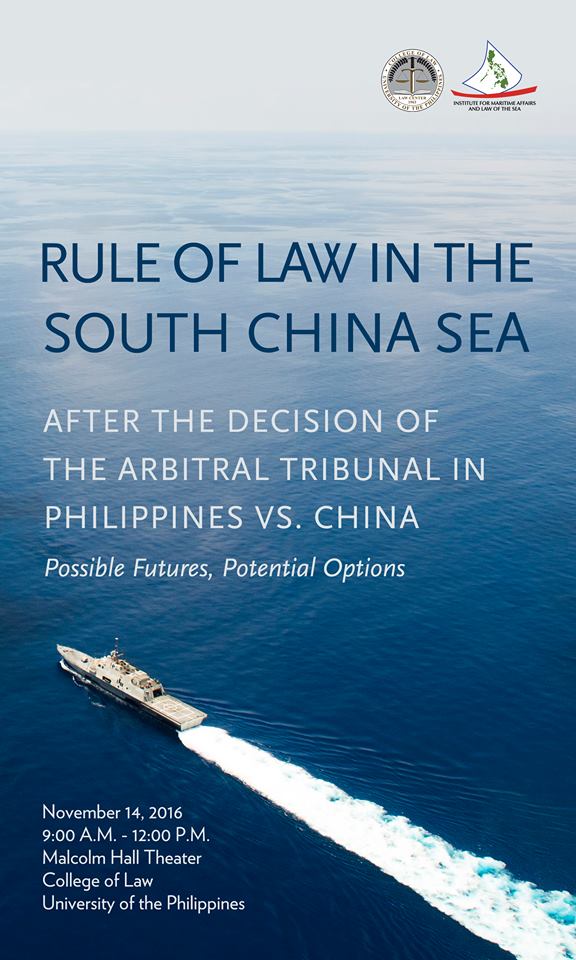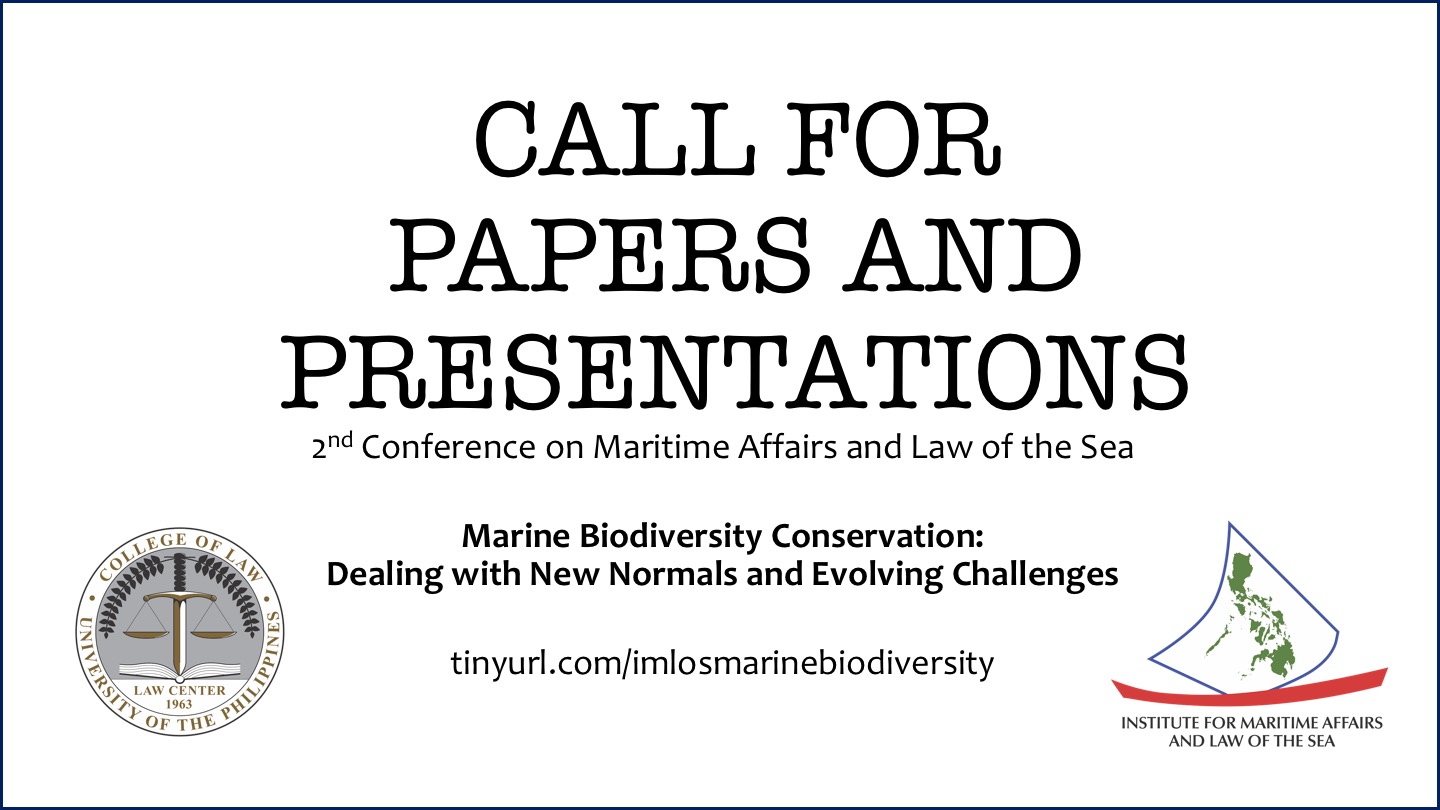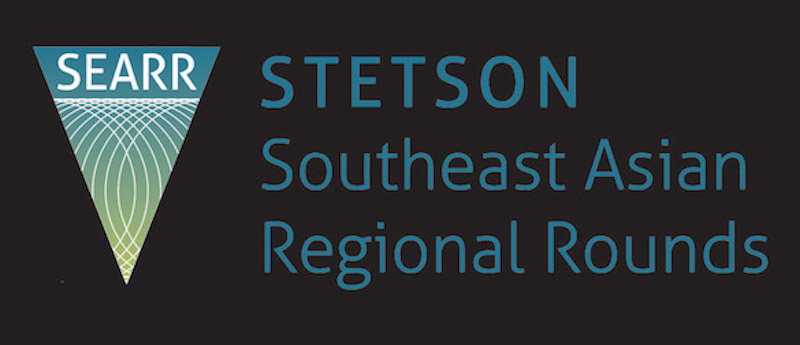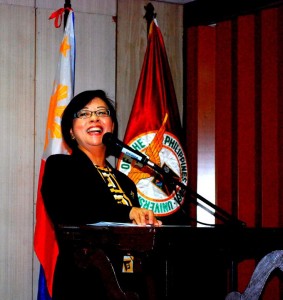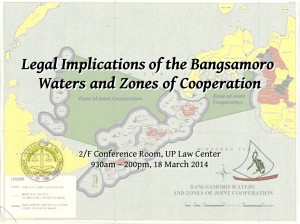Philippines – United States Mutual Defense Treaty and Philippines – United States Security Relations: Evolution or Entropy
Philippines and China in the Year After the SCS Arbitration
Rule of Law in the South China Sea: After the Decision of the Arbitral Tribunal in Philippines vs. China
Call for Papers and Presentations on Marine Biodiversity Conservation
2nd Conference on Maritime Affairs and the Law of the Sea
MARINE BIODIVERSITY CONSERVATION:
DEALING WITH NEW NORMALS AND EVOLVING CHALLENGES
CALL FOR PAPERS AND PRESENTATIONS
Current trends and challenges in marine biodiversity strongly suggest the need for an interdisciplinary approach in policy and research. The integration of different fields into the marine sciences, in particular, is crucial in crafting effective frameworks to address the twin goals of protection and conservation. Avenues to encourage a plurality of perspectives on marine biodiversity should thus be promoted.
In this context, the UP Institute of Maritime Affairs and the Law of the Sea (UP IMLOS) is pleased to host its second conference on Maritime Affairs and the Law of the Sea to be held on January 3-4, 2017, at the University of the Philippines College of Law. The theme for this year is Marine Biodiversity Conservation: Dealing with New Normals and Evolving Challenges. The conference will thus provide a forum for exchanging ideas on the breakthroughs and special challenges surrounding the field. Participants are invited to present their research on conservation and protection efforts, and contribute towards understanding the interface between practical management and interdisciplinary approaches.
Submissions from students, members of the academe, and representatives of NGOs, government agencies and international organizations are welcome, particularly addressing the following questions:
- What are the contemporary challenges in the protection and conservation of marine biodiversity?
- Are existing regimes for geographic and jurisdictional governance of marine biodiversity (e.g. territorial seas, enclosed and semi-enclosed seas, EEZs, the continental shelf, the high seas), sufficient for its protection and conservation?
- Are the law, the sciences and/or other fields able to adapt to contemporary challenges and future trends in the protection and conservation of marine biodiversity?
UP LAW Gears Up for Stetson Southeast Asia Regional Rounds (SEARR) 2017
Once again, the University of the Philippines Law Center through its Institute for Maritime Affairs and Law of the Sea (UP-IMLOS) and Institute for International Legal Studies (UP-IILS), invites law schools from all over Southeast Asia, to participate in the Southeast Asian Regional Rounds (SEARR) of the 21st Stetson International Environmental Law Moot Court Competition (Stetson). The SEARR will be held at the UP College of Law in Diliman, Quezon City, Philippines on January 5-7, 2017.
For more information, please visit the Competition Website: http://imlos.upd.edu.ph/stetsonsearr/.
UP LAW to host 2016 Stetson Southeast Asian Regional Rounds (SEARR)
The University of the Philippines Law Center, through its Institute for Maritime Affairs and Law of the Sea, invites law schools from all over Southeast Asia, to participate in the Southeast Asian Regional Rounds (“SEARR”) of the 20th Stetson International Environmental Law Moot Court Competition (“Stetson”). The SEARR will be held in UP College of Law in Diliman, Quezon City, Philippines on January 14-16, 2016.
The International Finals of the Stetson, which will be held in Gulfport, Florida on April 13-16, 2016 is the most prestigious international environmental law moot court competition focusing on important global environmental challenges. Since 1996, law students from universities all over the globe have participated in the Stetson. Information on the Stetson may be accessed at the Stetson Law website (http://www.stetson.edu/law/international/iemcc/).
In order to qualify for the Stetson International Finals, participants must compete in regional competitions. ASEAN countries Brunei Darussalam, Cambodia, Indonesia, Laos, Malaysia, Myanmar, the Philippines, Singapore, Thailand and Vietnam, are required to participate in the SEARR before advancing to the International Finals. The SEARR is a great opportunity for law students to meet and compete with other universities in the Southeast Asian region. Law schools interested in participating in the SEARR may send an e-mail to the organizing committee at 3rdsearr@gmail.com.
IMLOS holds symposium on Maritime Issues of the Comprehensive Agreement on the Bangsamoro
The Institute of Maritime Affairs and Law of the Sea (IMLOS) of the University of the Philippines Law Center held a symposium on the legal implications of the New Bangsamoro Waters and the Zones of Joint Cooperation last March 18, 2013 at the UP Law Center. The speakers were experts and individuals involved in the process of drafting the Comprehensive Agreement on the Bangsamoro.
Professor Miriam Coronel-Ferrer, chairperson of the GPH Peace Panel, discussed the Addendum on Bangsamoro Waters and Zones of Joint Cooperation. She discussed the impact of wealth sharing and power sharing on the Bangsamoro Waters, and touched on the topic of preferential fishing rights in the Zones of Joint Cooperation for the Bangsamoro and other indigenous peoples in the adjoining provinces.
IMLOS Director Professor Jay Batongbacal, who assisted the GRP Panel on crafting the initial ideas for the Bangsamoro Waters discussed the legal geography of the new Bangsamoro Region.
Professor Dante Gatmaytan, a constitutional law expert commissioned to assist in working out the terms on natural resources and ancestral domain, discussed the constitutionality of the Bangsamoro Basic Law. He describes the agreement as a test on the limits of our Constitution in the context that it is reconciling a separatist movement with a constitutional regime. He concludes that Comprehensive Agreement on the Bangsamoro can be accommodated by the present legal framework and the enumeration of powers therein is in consonance with Article X of the 1987 Constitution.
Dr. Diane Desierto, an expert in international economic law and professor at the University of Hawaii – Richardson School of Law, provided views on investment implications of the Bangsamoro agreement and its annexes. She pointed out things to consider under the annexes that need to be managed in terms of the expectations of the Bangsamoro having exclusive powers over investment and the central government spelling out investment policies on the treaty level and the national legislative level.
Reactions and questions were raised by representatives from different sectors such as fisheries, petroleum, maritime transportation, marine conservation and protection, and indigenous peoples. Undersecretary for Political Affairs Chito Gascon joined the speakers in responding to the reactions and inquiries raised by the audience.
Prof. Batongbacal ended the symposium with his synthesis of the speakers’ messages and the reactions of the audience. He said that there are still several issues to be resolved, such as clarifications on the impact of the Bangsamoro Basic Law with existing laws and the creation of dispute resolution mechanisms, as the agreement was not designed to cover all the issues that may arise. The various points raised in the symposium will be forwarded to the Bangsamoro Transition Commission, Office of the Presidential Adviser on the Peace Process, and the GPH Peace Panel.
The signing of the Comprehensive Agreement on the Bangsamoro is set tomorrow, March 27, 2014, at the Malacanang Palace which will end the seventeen years of negotiations between the Philippine Government and the Moro Islamic Liberation Front.
– JM Plaza
Originally published here.
Legal Scholars to Discuss Implications of Bangsamoro Waters Addendum at UP
On Tuesday, March 18, the University of the Philippines Institute for Maritime Affairs and Law of the Sea (UP-IMLOS) will be hosting a symposium on the legal implications of the latest addendum to the Bangsamoro Framework Agreement. Signed on January 25, 2014, the addendum supplements the earlier provisions of the Agreement on the wealth-sharing scheme to govern the relations of the Philippine Government and the resulting Bangsamoro entity, with the emergent concepts of Bangsamoro Waters and Zones of Joint Cooperation in the Sulu Sea.
Government Peace Panel Chairperson Miriam Coronel-Ferrer, also a professor of political science at the UP, will provide a background on the Agreement and the Addendum, and their salient provisions. UP-IMLOS Director Prof. Jay Batongbacal, meanwhile, will discuss how the “regional waters” up to 12 nautical miles from the low-water mark of the coasts of the land territory of the Bangsamoro and the “zones of cooperation” relate to natural resource allocation schemes under current law. UP Law Professor Dan Gatmaytan will explore the implications of the creation of what is essentially a “super-autonomous” region in the south. Former UP Law Professor Diane Desierto, now co-director of the ASEAN Law and Integration Center (ALIC) at the University of Hawai’i, will delve into the investment implications of the Framework Agreement. The talks will provide the groundwork for participating agencies and stakeholders to discuss the best ways of implementing the agreement through the prospective Basic Law for the Bangsamoro.
The workshop will be held from 9:00 A.M. to 2:00 P.M. at the 2nd floor conference room of the UP Law Center (Bocobo Hall), Diliman, Quezon City. For more information, please call (02)920-5514 local 218.
New Release: Primer on the West Philippine Sea
The updated Primer on the West Philippine Sea has been released. Click here to download.

